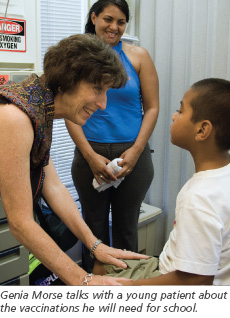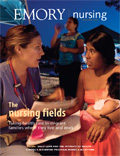Eastbound and down
Truckin' in health care to the underserved
|
|
The young Hispanic woman sat on the exam table, glancing down at the purple iridescent nail polish on her toes as she knocked her black wedge sandals against the side of the table. She was relieved that her name had been called so she could step inside the air-conditioned Wellness on Wheels van and out of the hot summer sun.
She told nurse practitioner Genia Morse, 74N, that a fish bone had irritated the back of her throat. As the conversation continued in Spanish, other details emerged. She also said she might be pregnant. She would not get a pregnancy test that day because the van had needed repair and the last clinic had been conducted inside the office of a refugee agency, the pregnancy tests were inadvertently left behind. Such is the challenge of a mobile health service.
The woman was just one of dozens of people who visited the mobile health unit that afternoon when it was parked in the back of a run-down apartment complex in Doraville, Ga. And like many others, she will be back. She knows the van comes regularly to the area, and without health insurance, she uses the mobile health service as a main source of primary care.

Wellness on Wheels (WOW) provides free services in DeKalb County neighborhoods where a large percentage of the residents have no insurance and are medically underserved. Morse has overseen WOW since DeKalb Medical Center’s foundation started the program in 1999. Knowing how much Wellness on Wheels is needed is one reason Morse loves what she does.
Morse has worked with low-income and medically underserved people since graduating from Emory. "Being a community health nurse allows me to make an impact through providing preventive care," she says. "It's about realizing that you can make a difference in someone’s life."
Becoming an advocate
Community nursing goes beyond the one-to-one contact that nurses usually have with their patients, she says. It allows them to address more: medical problems that become exacerbated because of lack of means, language barriers, or cultural differences. Sometimes it means being an advocate. She recently called an Atlanta hospital to help an Asian immigrant, who was worried about an expensive surgery bill, get enrolled in a program for low-income patients, for example.
She became interested in community health nursing when she went with her older sister, Mary Ellen Pendergrast, 70MN, on a home visit while Pendergrast was working for a metro Atlanta board of health. Morse witnessed the passion her sister had for her patients and later decided to make the underserved community her professional focus.
While at the School of Nursing, she worked in a 24-bed hospital in Nome, Alaska. After graduation, she worked in a hospital in Haiti for a year. Before she joined WOW, she worked with poor rural communities in Appalachia, a migrant health clinic in Colorado, and a health center for low-income clients in downtown Atlanta.
"Obviously I love travel," she says of her career. "What's great about the Atlanta area is that it's such a melting pot. There are so many people here who need help navigating the health care system."
Some days she sees an endless stream of patients who congregate outside, regardless of the weather. There is little room to maneuver in the van, which is packed with two exam rooms, four other staff, supplies, a computer and desk, and a small loveseat for waiting patients. (Come late 2008, Morse and her staff will have more room. They are getting a new motor coach.)
Regardless, Morse says there is little else she would rather be doing. She says her grandfather always told her, "From whom much is given, much is expected," and she still believes that today.



